
Jeff Parker: The ‘Atlas’ Exit Interview
Four years ago this month, "Agents of Atlas" #1 hit comic shop shelves from Marvel Comics, and last week, after five series, 29 issues, two spin-off miniseries, and guest appearances in everything from "Thunderbolts" to "Marvel Adventures Avengers," the series came to an end with "Atlas" #5.

We've known it was coming for a while -- the news actually broke in an interview here at ComicsAlliance -- but that doesn't mean we're any less sad to see it go. So today, to mark the passing of one of my favorite comics, I sat down with series writer Jeff Parker to take a look back on its endings, its beginnings, and its best moments, complete with a look at never-before-seen sketches, news on the artist who almost drew it, and the strange secret connection to the origin of Red Hulk!
ComicsAlliance: Might as well start with the big question: How do you feel about the series, what you accomplished, and how it ended?
Jeff Parker: I feel a bit remorseful, but pretty satisfied. I had some stories I wanted to tell and don't know if I'll ever get to, but I am very happy with what we did do, and with working with some of the top talents in art who all got into the stories so much. It became, not surprisingly, the kind of thing I would have been into as a reader.I felt we went interesting places and told different kinds of stories than you might see in a Big Two book. Even when they meet other characters and fight, I tried to defy expectations of that kind of plot. That's more or less established at the end of the first mini-series when Jimmy Woo decides to run the Atlas Foundation rather than destroy it. CA: What was the reaction that you got from fans? It's had a very vocal fan-base since its debut.
CA: What was the reaction that you got from fans? It's had a very vocal fan-base since its debut.
JP: I like to meet them at shows, they're so into it and appreciative -- they understand that this isn't what's going to dominate the sales charts right now, but it's the kind of thing they like a lot. They make the coolest sketch requests from Gabe Hardman, I love seeing those.
CA: You talk about defying expectations for a Big Two book, but even within Marvel, it's not really the standard sort of book. I remember when it came out, a lot of people were interested in it because it seemed more like what DC had done in embracing their Golden Age characters, while at Marvel, with the exception of Captain America and Namor, a lot of that stuff had been ignored.
JP: Yeah, with Marvel it's always been kind of understood that history begins really with the Silver Age. Maybe if like DC there had been more legacy characters in the Silver Age, that connection would have grown. Of course then we'd all be reading "The Wonderful Whizzer" #890 right now. I was lucky enough to get away with retconning a lot of the Agent's backstories as it suited the book, because it's harder to find the original stories to check against, and many of them are so wacky no one blames me.
CA: Was that something you found freeing, or was it more part of the challenge of trying to get people to care about these characters that were ostensibly brand new, but still had a long history?
 JP: Freeing, yes. But yeah, the challenge was [that] no one in the current market really grew up with these characters, and this current market -- as it pertains to Marvel and DC -- are all about what they grew up with. It's tough, because I think the Agents would have good mass appeal outside our industry, if they were to appear on TV or film. But you hear that a lot from low sellers, so it's conjecture on my part.
JP: Freeing, yes. But yeah, the challenge was [that] no one in the current market really grew up with these characters, and this current market -- as it pertains to Marvel and DC -- are all about what they grew up with. It's tough, because I think the Agents would have good mass appeal outside our industry, if they were to appear on TV or film. But you hear that a lot from low sellers, so it's conjecture on my part.
CA: I wasn't going to spring this one on you so early, but I have to ask: Why do you think it didn't take off? The people who have read it seem to like it a lot, it's had amazing art, and at this point, you've made enough of a name for yourself that you're pretty recognizable.
JP: I don't want to attempt a pop psychology reason, so I'll make a jab at the overall approach of selling. The current readership (of Big Two books) is wildly conditioned to respond to "THIS IS AN IMPORTANT DEVELOPMENT IN THE OVERALL SUPERSTORY WE ARE TELLING." I've railed on this zillions of times, it's an emphasis on WHAT happens rather than HOW it happens. Downplaying Story in favor of Development -- it's the televisionization of comics.
Ah crap, I think I did attempt pop psychology there, sorry. But similarly, all these people who claim to hate tie-ins and crossovers and claim to want good characterization and art and escapism over rapin' and killin'... then why aren't you reading "Thor: The Mighty Avenger" by Langridge and Samnee? Maybe Marvel and DC just aren't as geared to getting the word out on stuff that's like that, but they are putting it out there. If it sold well, you'd see the landscape change overnight, because the publishers would follow. But these gems exist because some visionary editors like Mark Paniccia (Atlas) and Nate Cosby (Thor: TMA) are willing to lead that uphill battle.
CA: So editorial's been supportive of "Atlas?" I remember after our last interview where you announced you were ending it, there were people who still thought that it was getting the axe from on high.
JP: Well, editorial were willing to try to tie it into upcoming events, which would have buoyed it, got the numbers up and all. But I was so happy with The Return of the 3-D Man storyline and getting back to something self-contained, I just didn't have the energy for it. I enjoy Atlas off in their own corner, so I said I was going to stop. Everyone understood.
CA: Do you think it's really the last you'll do with the characters? You've been able to do stories with them outside their own book before.
JP: I'm not going to ponder it, because it would be so easy for me to shift back into Atlas mode if the opportunity arose that I don't need to. I'm just going to focus on Thunderbolts and Hulk right now.
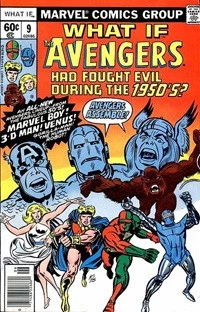 CA: So basically you're breaking up with Atlas. You've taken their number out of your cell phone.
CA: So basically you're breaking up with Atlas. You've taken their number out of your cell phone.
JP: Only because I can know it by muscle memory. It didn't launch Jake Oh, so what's the point?
CA: Let's go back to the beginning. How did it come about?
JP: You know what it really grew out of? I was one of the people submitting pitches for the "Doc Samson" mini they wanted to do. I didn't get that, but Mark Paniccia liked the super-pulpy directions I wanted to go in my series breakdown. Then he asked what I might do with the concept of the "Secret Avengers" from What If #9, and that set my mind racing. So there, we can all be glad that we 30-some issues of Agents of Atlas instead of Doc Samson! Who by the way is DEAD now.
CA: It was Paniccia's suggestion?
JP: Yes! For art, ["Starman" artist] Peter Snejberg was our main candidate at first- my original pitch I think sounded a lot more bleak than what made it to the presses.
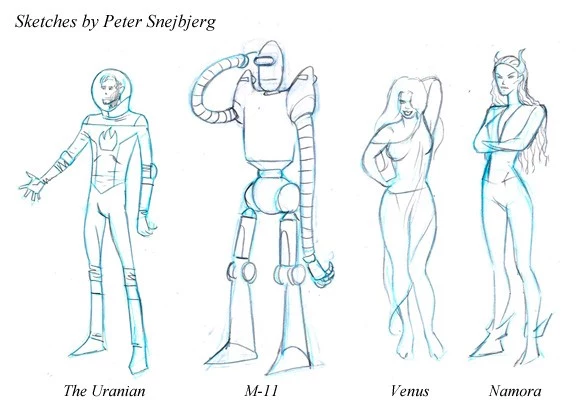


I don't remember what happened with him, he may have started working on WildStorm stuff.
We were casting around for artists. At one point I had suggested Paul Rivoche, but he was possibly committed to some animation work I think, and that never happened. But Atlas readers may remember that he came in later to draw the Robot Lab of Dr. Zu, the kind of design work Paul just dominates in.
Eventually Paniccia said "you know, Leonard Kirk can draw anything." And he's right, Leonard can, and extremely well! He was becoming Mark's go-to guy for many things, had just drawn The Scorpion with Fred Van Lente. And of course, he turned out to be great for Atlas, which required being able to draw the hell out of almost any genre. And naked ladies.
Way back in the first miniseries is coincidentally, when Secret Marvel (Joe, Jeph [Loeb], [Mark] Paniccia, [Greg] Pak, everyone involved in Hulk, etc.) were talking about the idea of a Red Hulk showing up at the end of World War Hulk. It was well decided that it was going to be Thunderbolt Ross, but I think everybody wanted a back door for the option of going another direction should something come up- which is a good practice in this kind of stuff. And that contingency turned out to be a character named Jake Oh, an agent of S.H.I.E.L.D. To help seed Jake Oh, we volunteered to put him in a scene in "Agents of Atlas," which turned out to be the scene you probably call Robot Carrying Gorilla With Four Guns.
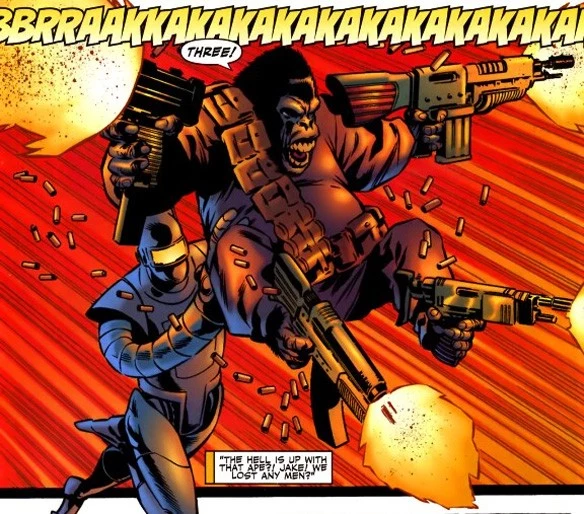
Of course that's the biggest moment of issue 1, but while Dum Dum Dugan is trying to stop the Mojave Base infiltration, he kindly yells an order to the only agent who gets a name....

...and then Leonard and I gave him another panel:

Again holding a ridiculously huge gun. I assume he would have ended up on the site when the satellites blast Hulk, get irradiated, etc. So Red Hulk was almost Jake-Effing-Oh. Rock on Jake Oh, you never amounted to anything.
By the way, Issue 1s are always, always a bear. That's where everyone gets to weigh in, and it's a lot of suggestions and changes. I believe I sent in six versions of the first script before Tom Brevoort signed off on it. And cover artist Tomm Coker did these really cool roughs that never got used, check these out.

For the most part Tomm conceived all the covers but I chimed in on issue 3 because I had a clear idea of that one. Tomm went with this essentially, but much closer in on Bob The Uranian.

Brevoort later gave me the perfect one line pitch that I really could have used when trying to explain what the book would be like: "The Marvel Rat Pack." I wish I could send that phrase back in time to 2005, it would have saved a lot of pitch documents. Here's my early rough passes of a logo. No one liked my jaggy ATLAS. I kept trying to make it a "villain's logo" and I think by the time of the first ongoing, we got there.
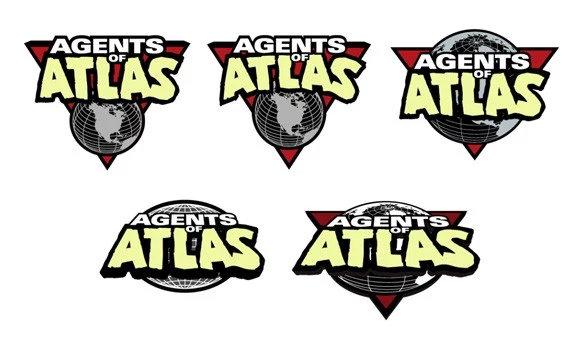
JP: The first mini was cathartic for me -- my dad had just died and I was completely into embracing escapism.
CA: Was that part of the motivation for making Jimmy Woo young again?
JP: The whole idea of Jimmy being brought back from essential death and restored to his young 50s self- that was pure wish fulfillment. Also he seemed so cool in those 50's "Yellow Claw" comics.
CA: It's weird to think that these stories about gorillas and robots and aliens are often informed by what creators go through in their real lives, but your comics -- and "Atlas" especially -- often have very human elements at their core. Like, Gorilla Man for instance.

JP: Oh definitely. I think that's why our readers respond strongly. They recognize something of themselves or their friends and family in the team.
CA: Yeah. I mean, here's a guy who is as comic book as you can get: Super-powered talking gorilla whose best friend is a robot. And yet, there's stuff in there with him dealing with his fear of dying, of being embarrassed about his past, not being able to fit in. There's really strong metaphors at work there.
JP: It's funny to watch my son go through an Atlas comic. He's 5, just starting to read, needs to be read to mostly. He goes through the book and keeps pointing at Ken Hale and asks me to tell him what Ken's saying. Because it's only what the gorilla says that matters.
CA: Clearly, you've taught him well.
JP: Also the team as a whole is all about second chances- they've all had one. I tried to keep that running throughout, and it worked well with bringing in the disenfranchised 3-D Man, Del Garrett.
CA: It seems like "Atlas" was a book that was about that on a lot of levels. You were literally using characters like the Yellow Claw that nobody had gone back to in decades.
JP: Yeah, I think everyone wanted to stay way clear of him!
CA: For obvious reasons.

JP: I love, love, love making you like a character you really feel you shouldn't. But "Atlas" was always pretty easy to write. Way easier to write than "X-Men First Class."
CA: Really? That's surprising. I felt like you had such a natural handle on those characters.
JP: Almost every issue was a struggle for me. It's the continuity, and the fact that I wasn't supposed to contradict any of it. I got to rebuild Atlas exactly as I wanted to, set up for everything I would need.
CA: I don't know if it was just a matter of timing or what, but it really seemed like "Atlas" was on a leading edge of a small movement to give a lot of characters new chances. You had Fraction and Brubaker on "Iron Fist," Jason Aaron's "Ghost Rider," Pak and Van Lente on "Hercules" which spun directly out of using Namora in "World War Hulk."
JP: Well, there's a common thread -- all of us are in fact, geniuses. Like Mensa and sh-t.
CA: What was, in your opinion, the best thing you did on the book? What are you most proud of?
JP: I would say having M-11 talk smack like Muhammad Ali, but Steve Lieber actually gave me that bit...
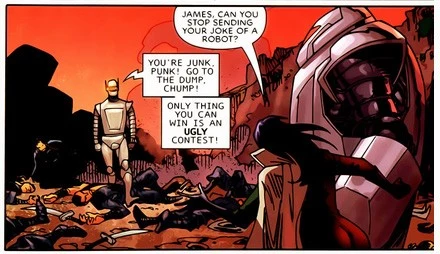
JP: What sticks out to you? This is tough.
CA: Honestly?
JP: Well yeah.
CA: That you actually managed to get a comic published that included the line "Uranus was beautiful and terrible at the same time."
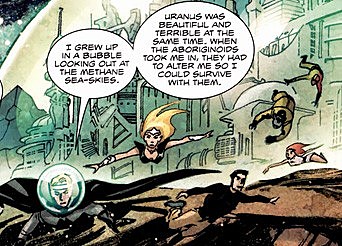
JP: Wasn't even a joke. I always use Ken to make the joke to defuse it, but I've now written about the planet so much I only think of it as a planet now. In the UK they still don't get why it would be funny because they pronounce it "Yurrinus." One of my favorite moments, another image that defines the book for me, is Marvel Boy flying up to the supersonic MIG jet and finding a skeleton inside. I got that page from Hardman, it makes me happy.
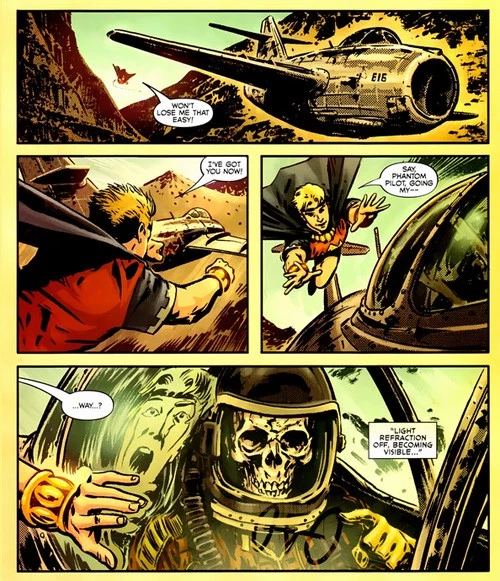
CA: More seriously, I think it's neat that you've given a great plot device to the Marvel Universe. Front companies that are secretly part of a villanous organization that are even more secretly part of a heroic organization, only some of it doesn't know they're heroic, is the kind of super-adaptable plot that I really think people are going to latch onto and use. I don't think it's ever going to go away, much like A.I.M. or Project Pegasus or U.L.T.M.A.T.U.M. or U.S. 1 don't ever go away, as long as there are people coming along and using them to make stories.
JP: Yes, US 1 never, never goes away, good buddy.
CA: Hey, he's been in two different comics this year. His time has come.
JP: I'm going to spoil the next Marvel giant event: it's a super-hero CONVOY. Black Bolt is driving a truck with Lockjaw. Ghost Rider is giving them fits...
CA: Does he crash Hell's gate doin' 98 and say let them truckers roll?
JP: 10-4! Come on back Wolverine, talk to Teddy Bear.
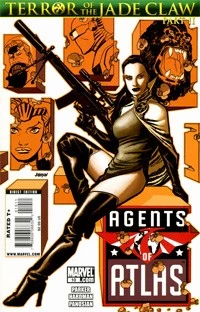 CA: If you had to point to one story, or even one issue, that would show people exactly what the entire book was about, what would it be?
CA: If you had to point to one story, or even one issue, that would show people exactly what the entire book was about, what would it be?
JP: Maybe... issue 10 of the last series, during the TERROR OF THE JADE CLAW story. We had everybody doing their thing, the Shore to Shore radio show with Webb Terry, a little bit of everything. My only true failure was not bringing back The Man With The Tri-Level Mind.
CA: I was convinced he was going to show up in the 3D Man story.
JP: Along with The Continuiteens from XFC.
CA: Any final thoughts on "Atlas" and what it meant to you as a creator?
JP: The book showed me that there are people out there who like the same kinds of stuff I do, rather the kind of viewpoints on telling a story that I do. I may have only reached some of them with Atlas, but it encourages me to charge ahead in my future work and entertain myself first. That always produces the best story.
More From ComicsAlliance
![’70s Gotham (And ’70s Nightwing) Come To Life In ‘Batman ’66 Meets Wonder Woman ’77’ [Exclusive Preview]](http://townsquare.media/site/622/files/2017/03/BM66MWW77-feat.jpg?w=980&q=75)
![Friendly, Wholesome, And Tough: David Hahn And Karl Kesel On The Art Of ‘Batman ’66 Meets Wonder Woman ’77’ [Interview / Preview]](http://townsquare.media/site/622/files/2017/01/B66a.jpg?w=980&q=75)
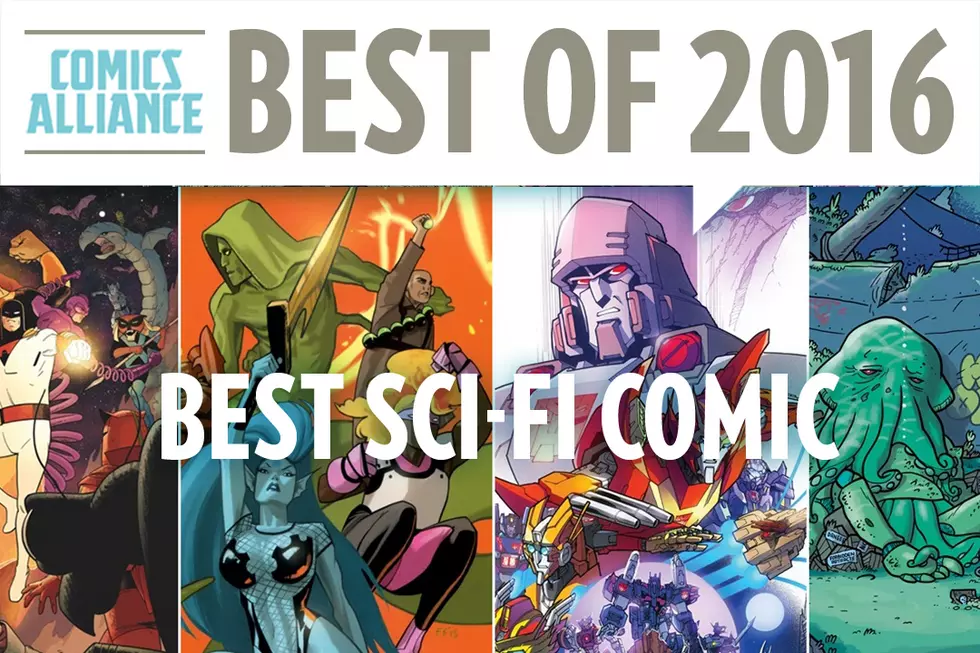
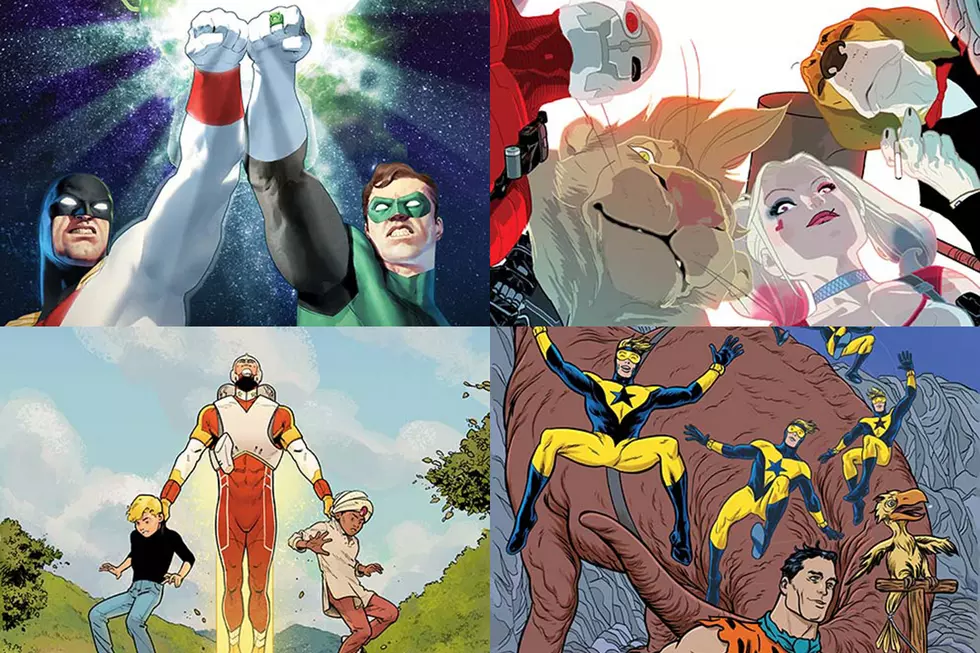


![Get Ready For Frankenstein Jr. In ‘Future Quest’ #6 [Exclusive Preview]](http://townsquare.media/site/622/files/2016/10/FQ00.jpg?w=980&q=75)
![Two Iconic Heroes Meet For The First Time In ‘Batman ’66 Meets Wonder Woman ’77′ #1 [NYCC 2016]](http://townsquare.media/site/622/files/2016/10/BMWW.jpg?w=980&q=75)
![Cast Party: Who Should Star in a ‘Flash Gordon’ Movie? [Sci-Fi Week]](http://townsquare.media/site/622/files/2016/09/ElleCollins_CastParty2.jpg?w=980&q=75)
